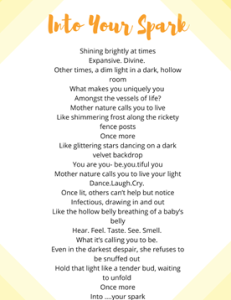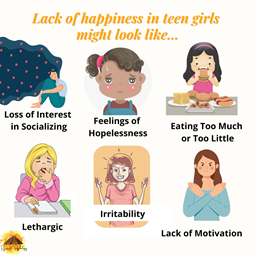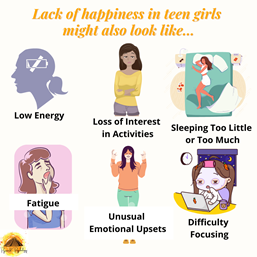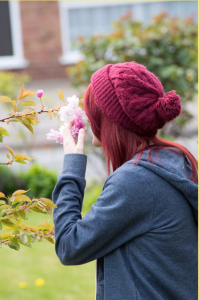5 Ways Parents Can Cultivate Teen Happiness
I was listening to Dan Harris’ ‘Ten Percent Happier’ Podcast the other day, where he was talking with his guest Dachner Keltner on fostering more happiness. I instantly got thinking about how the ideas that he shared, if applied to parenthood, could make a real difference in bringing more happiness into teens’ lives!
Teen Happiness – Remembering the “Awe Factor”

Picture walking on a grassy ridge that overlooks a large valley. The sun is breaking free from the few puffy white clouds in the sky, illuminating the valley below. The green peaks and valleys go as far as your eye can see. If you imagined this and felt a vast amazement kinda feeling, this is awe.
What do you notice when you think of feeling awe?
For me, I feel an expansiveness in my heart centre; a sensation of openness. My body feels good vibes, you know the warm, fuzzy, tingly kind. I get these feelings when I see my kids doing something they truly enjoy, watching a spectacular sunset, seeing the mountains in the horizon, to name a few. I’m so grateful for the feeling of awe- what brings you awe?
When your teen does something that frustrates you (and they will!), or when they push back (they will do this too!) it is easy to jump into reactivity, or feel like you want to lay the hammer down. Often, this ends up in a head to head conflict and doesn’t solve the situation.
At one point, though, you probably felt awe in the presence of your daughter- perhaps she was itty bitty and gave you her first smile or when she took her first steps- read her first word. It might have been recently, responding to a situation in a way you admired – an act of kindness, standing up for someone, etc.

Photo by Canva
When you’re frustrated with your teen, try to think of them in those moments – the way you felt; the thoughts and sensations you experienced while in awe. Use these sensations as an anchor to hold onto when you feel frustrated, discouraged, or disappointed in her behaviour. Try it and see what happens!
It’s harder to be reactive when you’re feeling lovey….and more lovey feelings translates to more Happiness.
Teen Happiness – Play and Laughter
In Dan’s Podcast episode, he shared the importance of creating joy, play, and laughter in our lives. There are various elements that affect the way humour/play is perceived – cultural factors, gender nuances, past experiences, etc.
In the context of your relationship with your teen, think about how you bring play and humour into the relationship. Do you read the room and drop in a playful tone, some lighthearted teasing, or joking and laughter?
There’s a time to be serious no doubt, but consider how your tone influences the conversations with your teen. You can show lightheartedness through your actions and your words.

Photo by Canva
It’s also a respectful approach to check-in with how your teen is perceiving the joking and playfulness that you bring into the relationship.
A friend of mine gave my son an endearing nickname only a few days after he was born, and it stuck ever since! I recently became aware that when I use the nickname in front of his friends, they playfully poke fun at him about it. When I recognized this, I later asked my son how he felt about the nickname – and if he wanted some boundaries around when and where it was used?
It turns out, my son was totally fine with the nickname and I had nothing to worry about! However, asking your teen can increase their sense of connection to you while elevating their voice.
Bring lightheartedness and play into the conversation with your teen whenever you can, in a way that you both feel comfortable.
Teen Happiness – Gratitude
I talk a lot about gratitude – appreciation and gratefulness of things, qualities, aspects, etc. Gratitude, from my perspective, can be a really great parenting tool to increase your teen’s happiness.
Acknowledge the things you are grateful for as a parent – recognize when your teen does something kind and share the special things you see in them. Notice when they’ve made an effort to do well, or try something new, etc. It doesn’t have to be a big deal! When there is a quiet moment just the two of you, point out a thing or two you’ve noticed recently.
You can also build in a more formal practice with your family, perhaps checking in around the dinner table each night (or any night you manage to gather around). There’s an acronym exercise called GLAD- where each family member takes a moment to name something for each of these letters:
Gratitude – acknowledge something you are grateful for and appreciate.
Learned – share one thing you learned today.
Accomplished – recognize one thing you accomplished during the day.
Delighted – name one thing that lit you up today.

Photo by Canva
Creating this practice (or any that you find helpful) with your teen can create a positive mindshift and highlight things that bring happiness into your space. You can get some other ideas for family gratitude practices HERE.
Modelling gratitude and appreciation is a way for your teen to naturally build it into their own life. It probably drives my kids crazy (even though they don’t say it!), but I will often point out my gratitude for the majestic mountains on our drive into school. Or I’ll point out the beautiful sunrise, and notice the different shades of light and clouds. Sharing these moments of appreciation can help your teen appreciate things around them, too.
My colleague Jessa Tiemstra, wrote a really great article on gratitude last week, including the science behind why it improves happiness. Jessa also shares 10 ways you can increase gratitude in your teen’s life; exercises they –

Photo by Canva
or you – can do on your own (instead of as a family). Read the article HERE.
Teen Happiness – Respectful Communication
There are various styles of parenting, all of which involve different ways of communicating with your teen. If you aren’t sure of your style, you can read about the four different ones in my blog article ‘Parenting Styles 101: Bridging the Gap of Communication With Your Teen’. The authoritative style of parenting – where you set the expectations for your family with room for collaboration, is a form of respectful communication that I really see fostering positive outcomes for teens.
Communicating with your teen respectfully, in a way that allows them to share their thoughts, feelings, and opinions, elevates their voice and their confidence. There is a give and take in your relationship and this fosters autonomy, individuation, and the belief that they are capable. Not only are these important developmental pieces for teens, but it increases their overall satisfaction in their lives, and therefore happiness.
When you’re speaking with your teen, it can be helpful to focus on the way you are communicating more so than the content. How you say something – the tone you use, the way you say things, your body language, the head space in which you do it etc., makes a deeper impact, sometimes even more than what is being said.
Here are three tips for conversing with your teen in a way that will increase happiness for the both of you:
- If you’re feeling really emotionally fired up – which trust me, I understand! – give yourself some space. It’s okay to cool down and come back to a conversation another time.
- Try to use “I” language as much as possible. “I” language expresses your experience as opposed to “YOU” language which can feel blaming, that they made you feel a certain way (and oh I know it can seem that this is very much the case sometimes- but the reality is our thoughts cause our emotions not others), or putting the other person quickly on defense mode
So instead of saying, “you are making me so frustrated” you can try, “I am feeling frustrated with…” - Active listening – share back what your teen is saying with them. Check for accuracy… “It sounds like you’re feeling upset about how unfair this rule seems” or, “You seem sad about this decision”.
Reflecting back to your teen isn’t about changing anyone’s opinion or perspective, but rather allowing your teen to feel heard and correct us if we’re not understanding it the way they intended.
And, yes this is a two-way street. The more you model respectful communication with your teen, the more you build the foundation for them to pick up those ways of communicating.
Teen Happiness – Physical Touch

Photo by Canva
 Physical touch is one of the oldest modes of communication known to humans. In ways of increasing happiness, touch can represent celebration, encouragement, fun, and pleasure.
Physical touch is one of the oldest modes of communication known to humans. In ways of increasing happiness, touch can represent celebration, encouragement, fun, and pleasure.
While listening to Dan’s Podcast episode, I was fascinated by some of the research his guest had done on touch in high school basketball teams. The study looked at how much touch was happening – chest bumps, pats on the back, high fives, etc. The results of the study showed that the teams who had higher touch points in this kind of way did better overall.
Interesting, right?
Adding touch and physical contact when you are interacting with your teen increases your social connection with them, and their level of happiness as a result. A teen I was working with recently described how great a head massage feels. Or, it can be as simple as sitting close together, high fives, or hugs!
When you’re doing this, it’s important to consider welcome vs. unwelcome touch, as well as your teen’s personality – are they someone who generally enjoys touch? Are they comfortable with the physical contact you are making? Check in with them – make sure it’s okay to sit next to them, or offer a hug, etc. When the situation is feeling strained, your teen’s boundaries around touch may be different than when you are having a more connected interaction.
To recap how you as a parent can increase teen happiness you can focus on-
- Touch
- Respectful communication
- Gratitude
- Play
- The ‘awe factor’
You can make small, impactful changes in each area that will increase your teen’s happiness overall.
I recommend picking one or two areas to work on. Become aware of how things are in this area for you and your teen right now. Notice small differences in how your teen responds to you as you become intentional about your actions.
Happiness seems more complex today than it was when I was growing up. Your teen has a lot more on their plate than we ever did – navigating the current world, the overload of stimuli and information online, the various stressors, the pandemic! There is so much going on, that it is normal for families to struggle with their teen’s happiness.
Tackling the elements above is not a “try it once and your teen is happy” fix, the same as prescribing a depression pill isn’t an immediate fix for your teen’s problems – despite the fact that many of the teens I work with mention that a pill would “fix” everything. Increasing your teen’s happiness involves giving yourself grace, and continuous growth for both parties. The Happiness Pill Program is a 6 month coaching program for you and your teen daughter specifically designed to collaborate with you and other parents, as you navigate through which tools will work best for your teen. Your daughter will create a map of the life that she wants to live, and will work to design that life alongside other teens – she’ll know she isn’t alone with her struggles. You will both have a working frame to build on for happiness, so your daughter can intrinsically create it for herself.
When you’re ready to create a concrete plan for your daughter’s wellbeing, and want the support to follow that plan, you can book a free 20-minute call with me to discuss your options, including The Happiness Pill Program.

5 Practical Ways to Take Control of your Happiness
Chantal Côté (she/her) is a psychologist and teen life coach living in Calgary, Alberta. After over a decade in non-profit and community mental health, Chantal started Pyramid Psychology, a practice dedicated to supporting teens – a population she is constantly amazed by. Chantal is on a mission to help 100,000 teen girls (and their parents) build bulletproof mindsets so they can weather the ups and downs of life. As part of this goal, Chantal has had the privilege of speaking at various events – virtual and live – to support teens and parents.
Outside of this passion, Chantal is often in nature, writing poetry, playing ball hockey and hanging out with her loved ones.
Each week, Chantal writes a blog article in response to issues she hears from the parents and teens she connects with.
If you have something you’d like to read more on – email ideas and questions to info@pyramidpsychology.com or DM us via Instagram or Facebook.
































 Jessa is a counsellor that has recently completed her master of counselling degree through Athabasca University.
Jessa is a counsellor that has recently completed her master of counselling degree through Athabasca University.

 Oftentimes, teens wish they could simply take a pill and fix their depression, but this is often not a long-term solution.
Oftentimes, teens wish they could simply take a pill and fix their depression, but this is often not a long-term solution. 

 Chantal Côté (she/her) is a psychologist and teen life coach living in Calgary, Alberta. After over a decade in non-profit and community mental health, Chantal started
Chantal Côté (she/her) is a psychologist and teen life coach living in Calgary, Alberta. After over a decade in non-profit and community mental health, Chantal started 


























